A Middle-Eastern table is not complete without delicious, unctuous and smoky mutabal (roasted eggplant dip). Serve this snack or appetizer with homemade pita, vegetables or as a side to grilled proteins.
Enjoy on a mezza platter with other dips like Eggplant Hummus, Muhammara (red pepper dip) and Tzatziki.

Table of Contents
What is Mutabal?
Translating an Arabic word into English can be quite interesting. Depending on the dialect, some will pronounce (and spell) it as mutabal, m’tabbal, or even moutabel. Despite these alternate spellings, mutabal seems to be the most common and widely accepted spelling of this Middle Eastern eggplant dip.
Mutabal is a very important cultural dish. History is a bit murky, but if I was a betting man, I would say it’s a Levantine recipe (from Lebanon, Palestine, Syria). Today, it is enjoyed across the globe and is very closely related to its more popular cousin, Baba ganoush. The base is fire roasted eggplant (aubergine). It is inherently vegan. If you love Baba ganoush, you will love this aubergine dip.
It is a standard part of a meze platter or table (selection of small sharing appetizers like Labneh balls and pickle turnips) and will almost always be served alongside hummus. If you’re looking for a hummus recipe, try my Caramelized Eggplant hummus or my Blistered Cherry Tomato Hummus.
Mutabal vs Baba Ganoush
Much gets lost in translation, especially when creative liberties are taken with important cultural dishes. Traditionally, mutabal is prepared with fire roasted eggplants, garlic, lemon juice, tahini (paste made from sesame seeds) and a smattering of herbs and spices. Usually parsley and/or mint is used as garnish. Sometimes yogurt is added.
Baba ghanoush (alternate spelling) on the other should not be prepared with tahini. It usually has pomegranate molasses. But over the years and for various reasons, that distinction has faded and the recipes have morphed into a hybrid of sorts. I am doing what I can to preserve this distinction.
Ingredients
This recipe comes together with just a few ingredients. Make sure they are the best and freshest.

- Tahini: Tahini is an important ingredient. It is what differentiates this recipe from baba ghanoush. You can substitute tahini with Greek yogurt. I still encourage you to get some Tahini which is now widely available at most grocery stores and online. Plus you can use it many of my other recipes such as Musabaha (creamy warm chickpeas) and Fattet Hummus (chickpea and yogurt with toasted pita).
- Eggplant: The best eggplants to use for this recipe are large globe or Italian eggplants. You can use Asian eggplants if that’s all you have on hand, but you will need more as they have much less flesh to work with. If you’re a fan of eggplants, try my Eggplant Bruschetta recipe!
- Lemon: You can use lime juice if in a pinch.
- Garlic: If you don’t like the taste of raw garlic, you can use powdered or roasted garlic instead.
- Garnish this dip as you wish. Note that dried sumac, fresh herbs (parsley and mint), chili flakes are traditional. You can also garnish with Za’atar spice blend (tasty but not traditional) or pine nuts.
See the recipe card for full information on ingredients and quantities.
How to Make this Mutabal Recipe
Traditionally, the eggplants are roasted directly on a flame. This could be a barbecue or the flame on a gas stove if you have one. Included below are 2 options for roasting the eggplant.
Roasting the Eggplant
Option 1 – Fire Roasting on an open flame for smoky flavor

1. Prepare. Poke the eggplants with the tines of a fork or knife a few times to allow for steam to release during the charring process (Image 1).
2. Roast. Place the eggplants directly on the burner of a gas stove set to medium-high flame. You can also use a gas or charcoal grill if you wanted to (Image 2).
3. Char. Roast, turning frequently, until the eggplants begin to collapse and are charred (Image 3).
4. Steam. Transfer the cooked eggplants to a medium bowl (glass or metal) and cover with plastic wrap. This will help the eggplants steam, allowing the skins to release. Set aside for 15 minutes then remove and discard the charred skin, leaving behind the soft flesh of the eggplant (Image 4).
Option 2 – Oven Roasting
Cut the eggplant vertically down the middle and rub the cut parts with a sprinkle of kosher salt and olive oil. Roast cut side down on a parchment-lined baking sheet for 20-30 minutes at 400°F (200°C). Eggplant will be ready when the skin collapses and the flesh is soft. Cool for 15 minutes before proceeding with the next step. Scrape the flesh away from the skin.
Preparing the Mutabal

5. Drain. Place the eggplant flesh into a fine-mesh sieve set over a bowl. Allow eggplant flesh to drain excess water for 30-60 minutes. Discard liquid (Image 5).
6. Mix. Add eggplant flesh to a bowl and mash with a fork. Add garlic, tahini, lemon juice, and cumin if using. Season with salt and pepper to taste. Add more garlic or lemon juice if you desire (Image 6).

Plate the eggplant dip in a shallow bowl or a rimmed plate and top with all or some of the garnish options listed. Olive oil is a must. Serve with pita, crackers, and/or crudité.
Video Tutorial
Expert Tips
- Select firm, blemish-free eggplants. Larger eggplants tend to have larger seed cavities, resulting in a finished product that is mealy and seedy. Choose medium sized Italian eggplants.
- Tahini, also known as sesame paste, is a staple food from the Middle East and North Africa. If that jar of tahini has been sitting in your pantry for over 6 months, consider discarding it. There are very few ingredients in this dish so it is important for them to all be fresh.
- Stir the tahini really well (or shake the jar vigorously) to re-incorporate the solids and the oil. As it sits, tahini will separate.
- Use as little or as much garlic as you wish. You can even use confit garlic if you have it on hand for a milder, richer garlic flavor.
- Can you make this in a food processor? Sure, but you’ll end up with a much smoother consistency.
- The toppings are what elevate mutabal and give it that extra oomph. I love adding fresh herbs like mint and parsley as well as pomegranate seeds, chili flakes (Aleppo preferred) and a drizzle of my best extra virgin olive oil.
Recipe FAQs
If you don’t have tahini on hand, you can still make a delicious eggplant dip. Just omit the tahini and add plain yogurt instead to reach the desired consistency. Season to taste and enjoy!
Traditionally, mutabal is prepared with fire roasted eggplants, garlic, lemon juice, tahini and a smattering of herbs and spices. Sometimes yogurt is added.
Baba ghanoush on the other should not be prepared with tahini. But over the years and for various reasons, that distinction has faded and the recipes have morphed into a hybrid of sorts. I am doing what I can to preserve this distinction.
This roasted eggplant dip does hold really well, and can be refrigerated for up to 3 days. It will begin to separate and you may have to stir it well to re-incorporate the juices. It is ideal to make it before serving, as that’s when it will taste the best.
Mutabal will keep in the refrigerator for up to 3 days. It is best enjoyed fresh. If you must, you can make it ahead by one day and store it in an airtight container until you need to serve it.
Alternatively, you can roast the eggplants in advance and mix the rest of the ingredients before serving.
More Delicious Recipes from the Levant Region
Main Dishes
Levantine Recipes
Levantine Recipes
Appetizers
If you make this Mutabal (Middle Eastern Roasted Eggplant Dip) or any other Levantine Recipe on Urban Farm and Kitchen, please take a moment to rate this easy recipe ⭐⭐⭐⭐⭐ and leave a comment below. It’s such a help to others who want to try the recipe.
For more Urban Farm and Kitchen, follow along on Instagram, Facebook, and Pinterest, visit the Urban Farm Shop, or subscribe for new posts via email.
Mutabal (Authentic Middle Eastern Roasted Eggplant Dip)

Ingredients
- 1 Eggplant, Large – or 2 medium
- 1-2 Garlic Cloves – Finley minced
- 3 tbsp Tahini
- 2 tbsp Lemon juice
- 1 tsp Cumin – Optional
- Salt and Pepper to Taste
Garnish with
- Extra Virgin Olive Oil
- Pomegranate seeds
- Fresh herbs – Mint and/or parsley
- Aleppo Pepper Flakes
- Sumac
- Cumin
Instructions
Roasting the eggplant
- Option 1 – Poke the eggplants with a fork or knife a few times to allow for steam to release during the charring process. Place the eggplants directly on the gas burner set to medium heat. Roast, turning frequently, until the eggplants begin to collapse and are charred. Transfer the eggplants to a glass or metal bowl and cover with plastic wrap. This will help the eggplants steam, allowing the skins to release. Set aside for 15-30 minutes then remove and discard the charred skin, leaving behind the soft flesh of the eggplant.
- Option 2 – Cut the eggplant vertically down the middle and rub the cut parts with a sprinkle of kosher salt and olive oil. Roast cut side down on a parchment-lined baking sheet for 20-30 minutes at 400°F (200°C). Eggplant will be ready when the skin collapses and the flesh is soft. Cool for 15-30 minutes. Scrape the flesh away from the skin.
Preparing the mutabal
- Place the eggplant flesh into a fine-mesh sieve set over a bowl. Allow eggplant flesh to drain for 30-60 minutes. Discard liquid.
- Add eggplant flesh to a bowl and mash with a fork. Add garlic, tahini, lemon juice, and cumin if using. Add salt and pepper to taste. Add more garlic or lemon juice if you desire.
- Plate the eggplant dip in a shallow bowl or a rimmed plate and top with all or some of the garnish options listed. Olive oil is a must. Serve with pita, crackers, and/or crudité.
Video
Notes
-
- Select firm, blemish-free eggplants. Larger eggplants tend to have larger seed cavities, resulting in a finished product that is mealy and seedy. Choose medium-sized Italian eggplants.
-
- Tahini, also known as sesame paste, is a staple food from the Middle East and North Africa. If that jar of tahini has been sitting in your pantry for over 6 months, consider discarding it. There are very few ingredients in this dish so it is important for them to all be fresh.
-
- Stir the tahini really well (or shake the jar vigorously) to re-incorporate the solids and the oil. As it sits, tahini will separate.
-
- Pita chips
-
- Tabbon Flatbread cut into wedges
-
- Tortilla chips
-
- Crudité (vegetables)
Nutrition
Nutrition information is automatically calculated, so should only be used as an approximation.
 Like this recipe? Rate & comment below!
Like this recipe? Rate & comment below!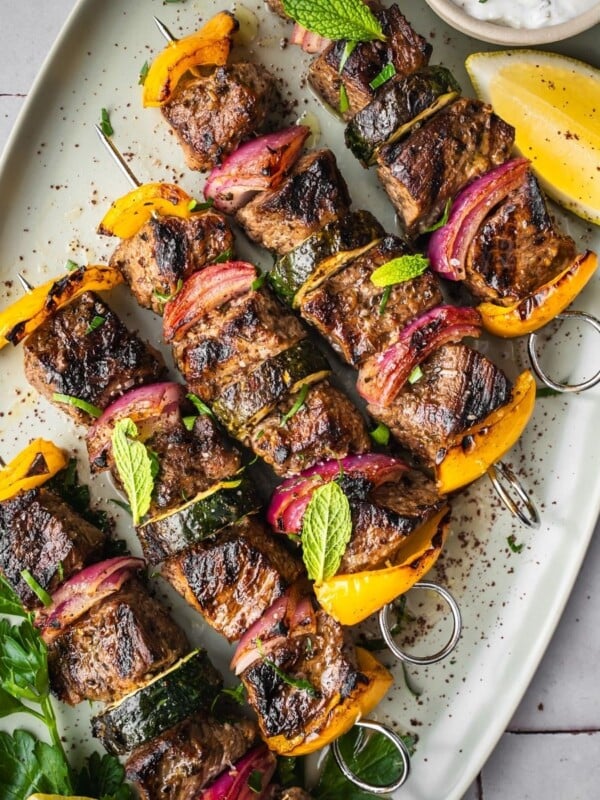

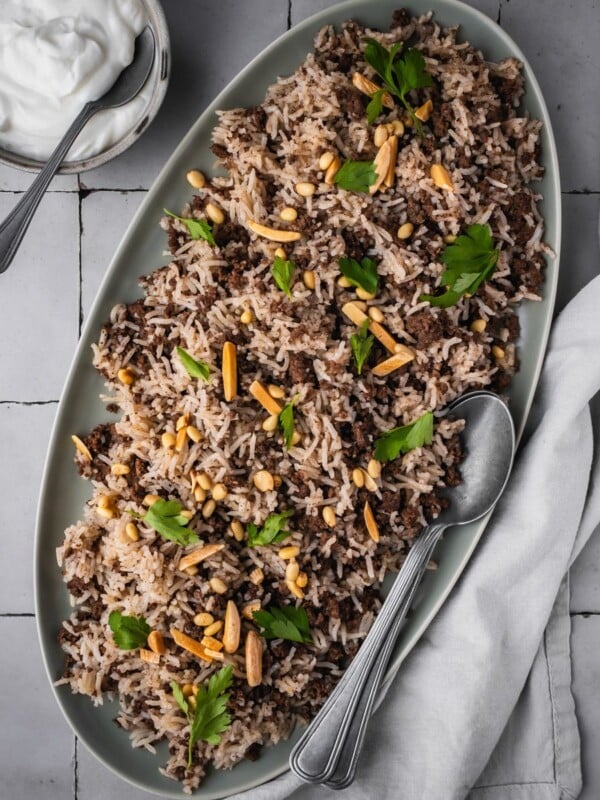
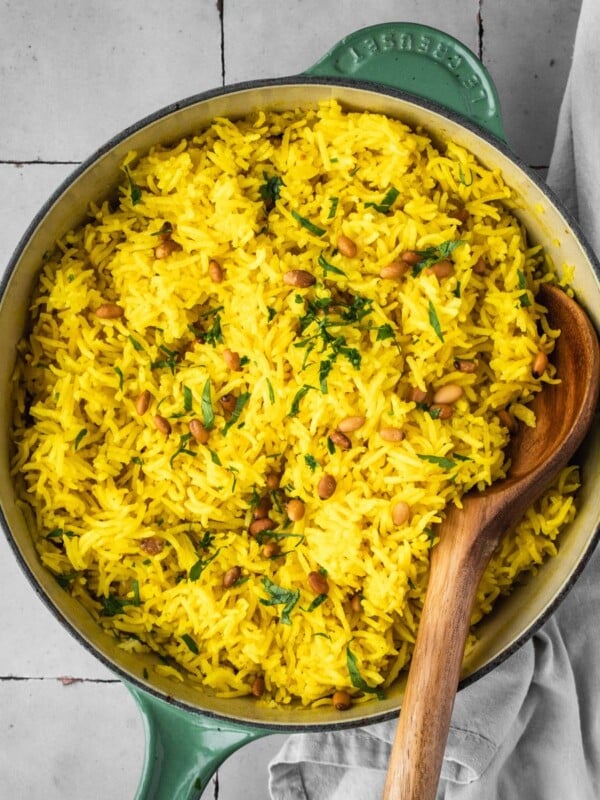
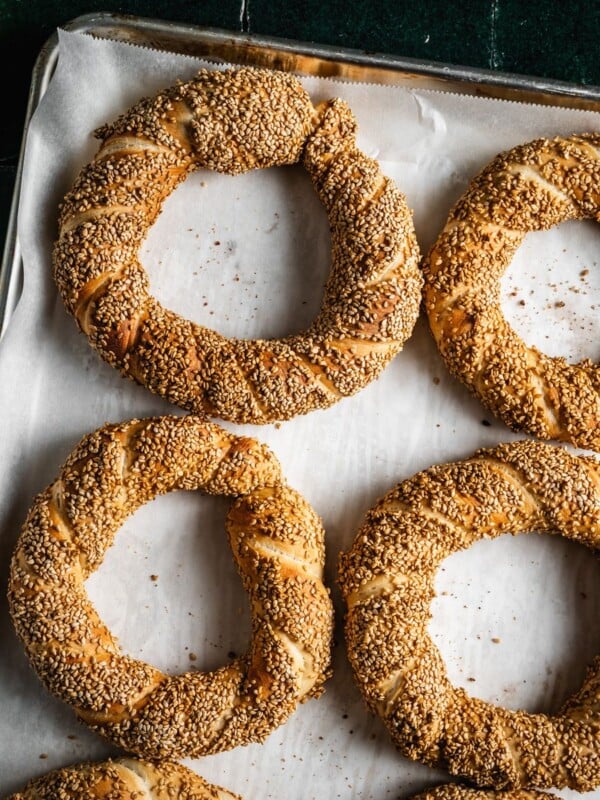
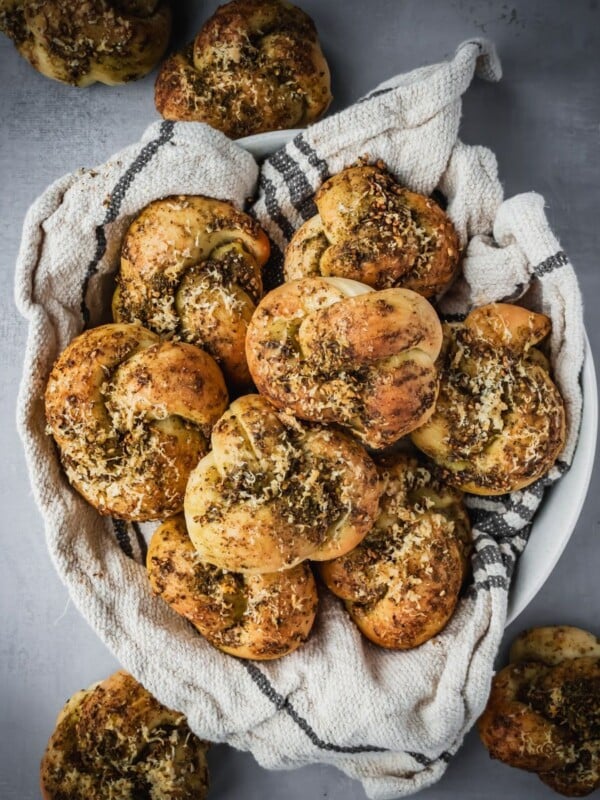
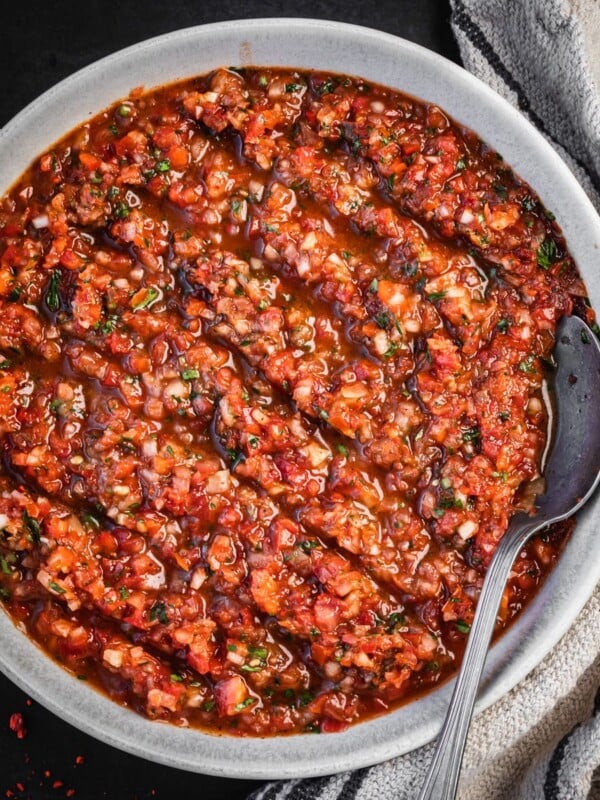
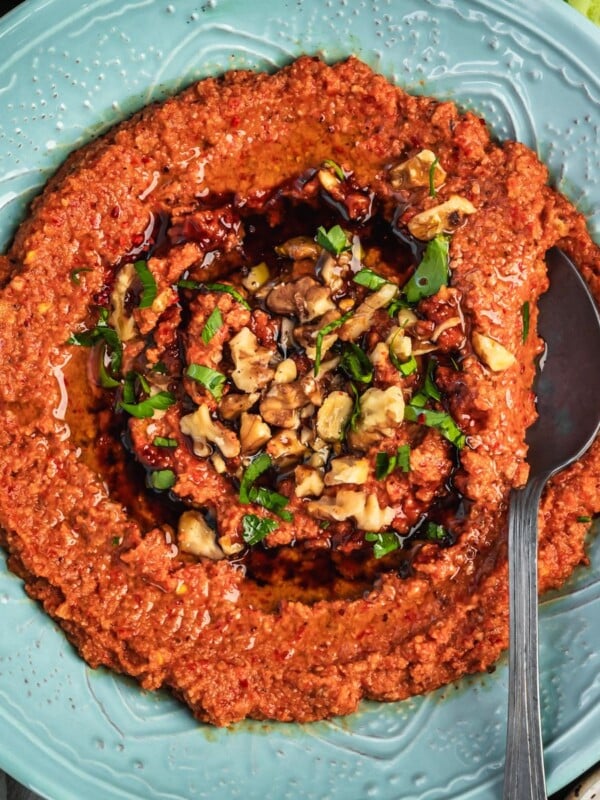








Nice; I didn’t know about the difference.